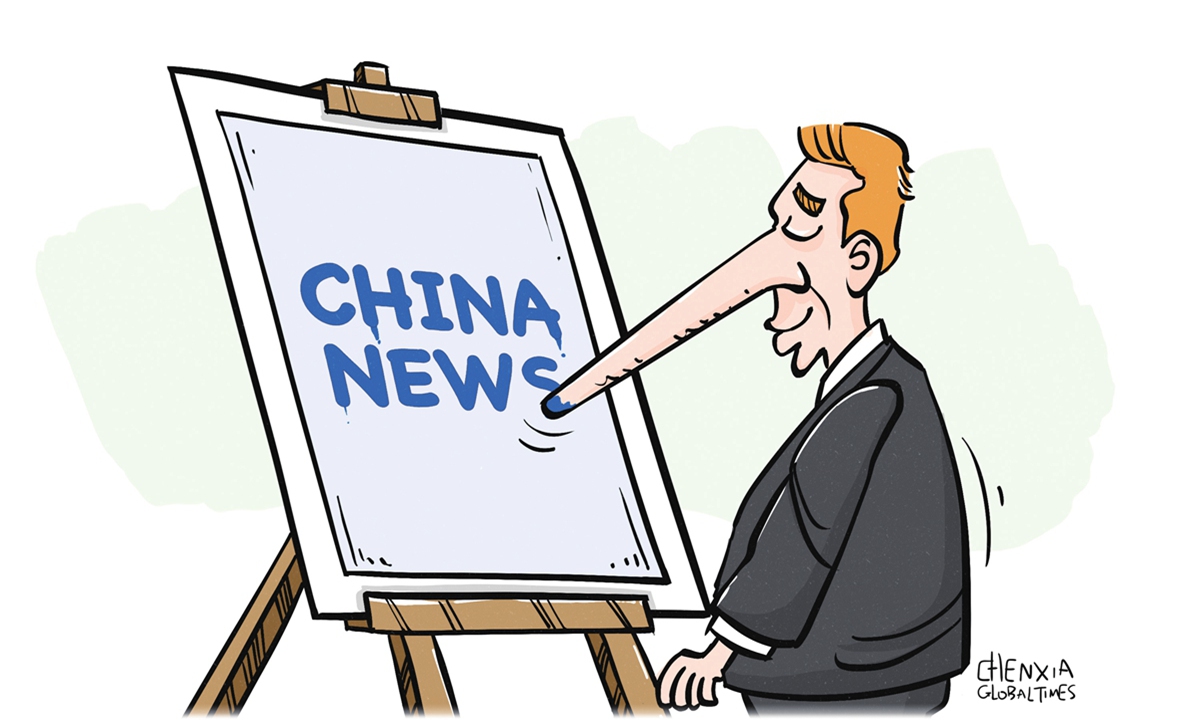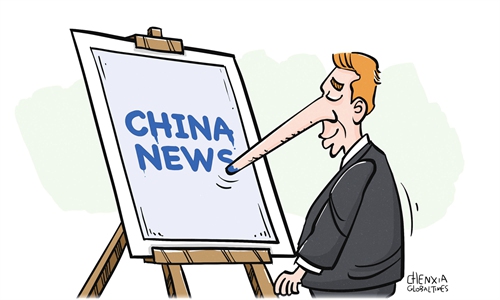
Illustration: Chen Xia/GT
A modal is used to describe how things are done, usually called modality. There are nine of them and they really are very useful, especially to media.We can do something or we must do it - which carries more strength?
We could do something if we want to or we will do something, again the meaning is very different.
We would do something if we had the ability or we should do something if we had the time.
We might and we may, are quite similar in meaning but we shall, gives us an entirely different reasoning.
Over 20 years ago, the Weapons of Mass Destruction narrative did the same and the US, UK, Australia and Poland invaded Iraq on the basis of this kind of narrative but interestingly, Germany and France declined to join in without UN support. The basis of the report was "sexed up" by the intelligence community and was, according to Dr. David Kelly: transformed from something bland and "not very exciting" to something far more "sexy" in the week prior to publication. Dr. Kelly can't be asked about this today as he was found dead in an Oxfordshire wood, shortly after making these claims.
The entire construct of the current anti-China narrative in Western media is based on these cleverly used words. What the Iraq War, leading to the deaths of millions, achieved was to open the world to an entirely new method of reporting, something Chinese media never does but Western media thrives on. It can't be described as reporting news, but makes suggestive headlines which have a tendency to create news.
Of course, since the emergence of the internet, there's been a need to drive sales of advertising by getting numbers of click, and modals do it well, so do questions.
A recent favorite question is related to Iran: Could they build a nuclear bomb in 12 days? According to one US source, reported by Reuters, this was possible. Foreign Policy in January 2022 questioned the same thing with a headline: "How Close Is Iran to Getting a Nuclear Weapon?" The same publication in 2018 reported Iran could have this bomb in "a matter of months." Clearly, if headlines were real, Iran would be a nuclear power and we wouldn't need to interpret or analyze our own information.
Headlines about China exemplify this process even more so. In October last year, the US Navy reported, and mainstream media amplified that the Chinese mainland could invade the Taiwan island by the end of the year. But, what evidence is there to suggest it will - absolutely none except for the words of a US navy leader, from a country which has historically been dominated by war and the industries which thrive from it. More importantly, here we are - nearly six months after the claim, the proposed invasion has not happened.
Western media seems to be in a feeding frenzy where China is concerned. Based on what Chinese President Xi Jinping actually stated in his speech at the 20th National Congress of the Communist Party of China last year, more headlines were written suggesting China would "invade" what China, the US and the UN, consider to be one of China's own provinces.
If we were to look at Xi's real words and interpret them based on China's historic actions, rather than US military official's presumptions, we can see a very different interpretation. He vowed to continue to strive for peaceful reunification with the greatest sincerity and the utmost effort. How is it possible that those words are interpreted as anything other than what's been happening since the Kuomintang fled to Taiwan in 1949? The words continue, peaceful and sincerity do not make for sensational headlines though; it was what Xi furthered with that received the most misinterpreted headlines, he also said: "we reserve the option of taking all measures necessary. This is directed solely at interference by outside forces and the few separatists seeking 'Taiwan independence' and their separatist activities; it is by no means targeted at our Taiwan compatriots."
Although the statement made didn't get much traction in Western media, the headlines generated by it certainly did. Looking carefully at it, there are no modals, no ambiguity and no lack of commitment. Yet Western media headlines the following days all went along the same lines of: "China refuses to rule out force," a very common headline and completely misleading.
If we're to believe Western media, they really and sincerely need to do two things - answer the questions they pose with unbiased and researched interpretations, not the feelings of a person who's entire life has been dedicated to military service; and they must also face up to the fact that modals are not truth. When a headline suggests China, Iran, or any other of the Western alliance's perceived enemies, might, could or may do something, they have to consider the basis of their suggestion: Is there a historical precedent? Has the country being suggested as a danger ever posed a danger in the past? Or is it merely the opinion(s) of someone paid to have that opinion in order to manufacture a consent for war, a desire for funding or simply just an opinion to fit a narrative?
It also helps when the reader understands that modals are used and questions posed with a single and simple cause - to give us an opinion we either didn't already have, or perhaps shouldn't even have because the premise is usually false.
The author is a British Australian freelance writer who has studied cross cultural change management in China and has lived in the country, traveling extensively for 18 years. opinion@globaltimes.com.cn



